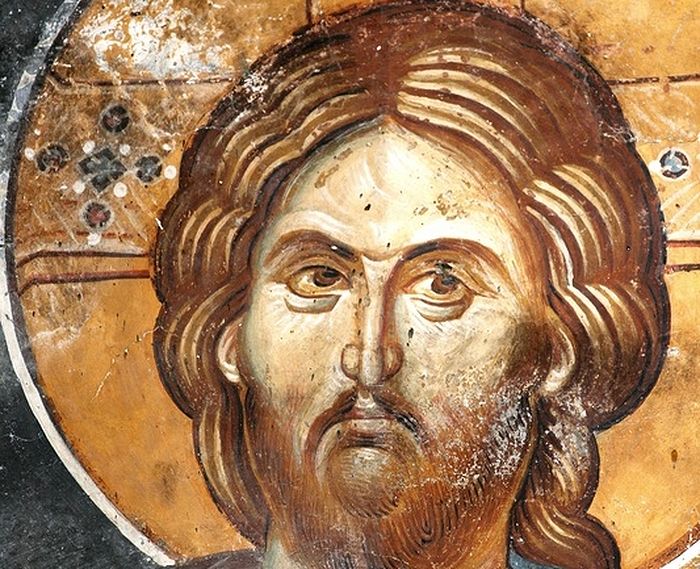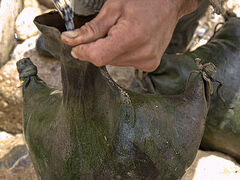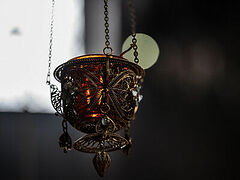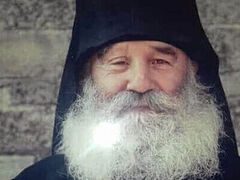Even when we were dead in sins,
He hath quickened us
together with Christ (Eph. 2:5).
Why does the Church talk about sin and constantly remind us that this here is a sin, and we shouldn’t do it? Why, what are the consequences of sins?
Sin deadens and kills the human soul. But to understand this, we have to be alive. A dead man isn’t afraid that he’ll die, because he’s already dead. He doesn’t feel anything. The dead is simply dead—not a little dead or very dead.
When the heart is dead, when a man is dead, he doesn’t feel anything: He doesn’t feel the consequences of the sins he commits, and even tries to enjoy his sins many times over, thinking this is natural, and tells himself:
“What happened? Oh well, what can I do??
He feels nothing and remembers nothing. He doesn’t believe that anything serious happened, something extremely important in his life, and sees no special reason why he should stop sinning. Because this soul is already dead; this soul is dead and feels nothing.
For it to feel something, a man must be alive. If you touch a living person, if you hit him or hurt him, he’ll feel it and say it hurts. Because a living man feels things, but the dead man doesn’t. Even if he’s sick and half-dead, the living man doesn’t cease to be alive and feel pain. He who is alive (bodily) may be full of passions, but his soul is still alive, and, of course, he understands the consequences of sin; he understands that sin is a poison that threatens to kill him; he sees his soul gradually drowning in this deadly intoxication with the poison of sin.
If you’ve ever had an operation and fallen asleep under anesthesia then you know that this sometimes happens to a man: one shot, a syringe that barely pricks you, but injects all the medicine into you. And whether you want it or not, you fly away: “Close your eyes!” they tell you. “Good night, Batiushka!” The same happens with sin, which lulls us to sleep and kills us.
But what will happen to us, the dead? What is our path? So we’re already doomed? No. Because, as the Apostle says here, while we were dead—our soul was dead in the midst of falls, a multitude of sins, and ignorance of God—God quickened us with Christ (Eph. 2:4-6).
He made us alive through Christ in this hospital of the Church, where everyone is sick and everyone is wounded; that is, we’re wounded and tormented by our passions. In this hospital, as in all hospitals, there is a place known as the morgue where lie the bodies of the dead. Those who are in the hospital but have already died have no more hope, for there is no doctor who could resurrect the dead. No matter how good he is, he can’t raise the dead. However, the hospital of the Church has one huge difference: Christ the Healer raises the dead here, and we’re all proof of this.
Of course, He resurrects us not by our deeds but by the grace of Christ. And it’s a fact that the greatest miracle is that of the Church. I often talk about it when I ordain priests, that “from now on you will see the greatest miracle, performed before your eyes, by your own eyes: By the grace of the priesthood, God will resurrect the souls of men.”
You see that a man comes, approaches the Church, but he’s spiritually dead. He’s a corpse, looking like a rotting corpse. But there’s something wonderful about him, that happens with beautiful people full of benevolence. And you see God before you, like a quiet breeze, blowing and animating everything—and you see how the soul of this man instantly resurrects, and you say: “Yes, my child! This man who was so-and-so, who was dead, a decomposing corpse, who stank a mile away—how did he end up like this? How did this soul resurrect?”
This is truly a miracle, which is repeated in the Church. This is a great miracle of the Church, above all other miracles. For example, here is a sick person who recovered, a crippled man healed by some miracle, some Divine intervention. Of course, these miracles are important and worthy of our admiration and reverence. We see them and should celebrate them, although they are all transient and temporary—even the miracle of the raising of Lazarus. He was resurrected; Christ resurrected him, although he died again in a few years. He wasn’t immortal, he didn’t remain forever in this earthly life. And when our soul resurrects, it’s no longer dying, but remains ever alive before God.
One of the greatest problems of our times, especially seen among the youth, is a dead soul. It’s very hard when the soul of a man, especially a young one, is dead. He wants nothing, feels nothing, strives for nothing, and nothing moves him. I pray to God that you wouldn’t encounter this, and that there would be no such people, but unfortunately, they do exist.
It’s hard to see young people—well, okay—not completely dead, but half-dead. For example, someone’s going to study abroad, but he doesn’t get up to go to class. Why?
“I’m feeling lazy!”
“But, my son, you went to study! At least get up to go to class!”
“But I don’t want to. I don’t see any point.”
“And your father, who’s sending you money?”
But it doesn’t bother him. Nothing bothers him; he wants nothing, nothing interests him, he doesn’t do anything, there’s nothing in him that would motivate him. His soul is dead. Whereas you see elders, old people, whose souls are like an erupting volcano: The lava is gushing and everything is shaking all around. You see such elders who possess such strength of soul. It’s a great thing.
We knew these modern elders, who lived in our days. They were great saints, and one of their main features was that, despite their age—they were eighty, eighty-five, ninety, or even a hundred years old—what souls they had! Eh, what can I tell you… They were living souls, and had the hearts of young men. They had spiritual strength, because they were alive. They had the life of God within themselves.
And at the same time, you see young people who are exhausted, wrung out, half-dead. They need a lot of everything to get themselves together; fifteen cups of frappe to wake up. But they still don’t wake up, don’t come to themselves, don’t get up for class in the morning…
Such are our times. It’s hard to revive the soul of a man. But the fact is that no matter how dead his soul is, it doesn’t become completely dead. As long as he’s alive bodily, there’s something alive deep within him, where lives the image, the breath of God given to him by God at creation. I think it’s very difficult for someone to obliterate this within himself, no matter how hard he tries and deliberately works on it. In His great love, God tries to keep this little flame alive, this spark, and the whole art consists in the man himself or someone else discovering this tiny spark shining deep within.
Of course, God, Who sees directly into the human heart, is the only One Who can kindle this fire, this tiny spark. Just as when we’re walking with a candle and a small flame flares up and immediately turns into a large flame, it’s the same here. Whether God Himself ignites it directly, or through some people or events, or some other way, the spark can ignite. Therefore, you don’t need to ever despair about anyone and say about him: “You know, nothing works out there; there’s no hope for him!”—because you don’t know this. As our elder said:
“Yes, my child, any person is a person, not a demon. No matter how bad he is, he’s a person. There’s something good in his soul, because that’s how God created us.”
Indeed, the Fathers teach that God created all of His creation very good, and man has the image of God, God’s goodness by nature. Although man later added the passions and buried it all, God has the power to penetrate deeply and unearth this goodness.
Sometimes we hear that some person is a killer, that he’s such and such. Sometimes the news talks about some cruel killer, and so on, that he’s a monster, and a terrible picture is created in our mind. The first time I went to a prison to hear confessions, they told me a man who had been sentenced to life imprisonment wanted to come see me. He had committed five or six solved murders and just as many unsolved ones. My heart started pounding. I said internally: “Most Holy Theotokos, what will he tell me; how can I relate to him? I mean, we’ll be locked up together, and what if I say the wrong thing and he finishes me off?”
His nickname was Dragon. That’s what the newspapers called him. And the warden prepared me:
“Father, you know, he killed so-and-so, strangled so-and-so…”
As a man, he wanted to prepare me, so I’d know who was coming to see me. And this man came like a man, like all people: the image of God—a wounded image—but the image of God nonetheless; a man without all that was attributed to him at the time. And you understand that in reality, no one is a demon.
Although, even the demons themselves are good by nature. God created them good. They themselves became evil and perverted their nature. But God created them good. They subsequently became evil, and their will became evil; they became hardened in evil. However, there is a spark in man, and therefore Christ didn’t allow us to condemn and judge anyone.
We don’t know much and we can’t condemn anyone. Proof? The thief who managed to enter directly into Paradise with Christ at the last moment, from the cross. He managed to commit his most successful robbery, as says St. John Chrysostom—he stole Paradise. He managed, being crucified, to enter Paradise with Christ. And he’s the only one about whom we have the clear testimony from Christ that Today shalt thou be with Me in Paradise (Lk. 23:43). While Judas was a disciple of Christ and worked miracles in His name, he still became the first to go into hell after Christ’s crucifixion.
Do you see that a man should neither judge nor condemn anyone, even himself? We must remember this, because the enemy of our salvation often wants to make us severe judges of ourselves and not allow us to see God’s love and our connection with God—our Father; to see that God is our Father. The enemy wants to convince us that “no matter what you do, there’s no salvation for you! You don’t change, you don’t free yourself, you don’t move forward, but, on the contrary, you move backwards.” This is blasphemy against the Cross of Christ and God’s love.
All salvation was worked by the grace of Christ—by it He saved us and He quickened us by His love, because He is our life. In the Church we don’t talk about theories, ideologies, and philosophies, but we deal with practical events. Here man is united with Christ and is revived by Him. Just as when one member is transplanted into another body, this member feeds on the living organism where it’s been transplanted; so we were transplanted into the Body of the Church by Baptism and we feed upon the Body and Blood of Christ.
So we live, so we exist, communing of the Body and Blood of Christ and laboring in the hope of Christ’s sacrifice offered on the Cross.





